How is classic MMO EverQuest still alive after two decades?
The beloved online RPG turns 20 this week
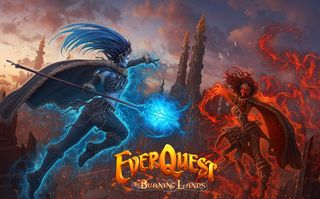
EverQuest, the pioneering fantasy MMO, turns 20 years old on March 16. But while most massively multiplayer games have a shelf life, and rarely make it through a decade, EverQuest has endured. The game is still in active development at developer Daybreak's San Diego headquarters, and more expansions are planned. I visited the studio and asked executive producer Holly Longdale about why she thinks the game has managed to stay afloat.
"EverQuest has essentially always been a survival game," she says. "You can't do anything significant without other people. You can't achieve the pinnacle of the game or get the best gear without being with other human beings. And that requires people to talk to each other and rely on each other. And that has, over the years, sustained this very social community."
"Our players organise themselves, which we feel creates a strong emotional commitment. And not just to each other, but to the game as well, and to their characters. And for us, for anything we do in the future, that sense of community really is the heart and soul of the EverQuest series."
Longdale adds that, in long-running, time-defying multiplayer games such as RuneScape Classic and EverQuest, getting to the really cool stuff almost always requires you to have other people to play with—and through that, strong and lasting social connections are inevitably formed.
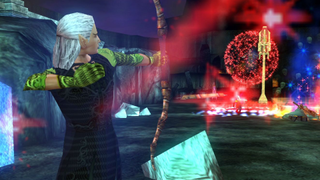
"When I play something like Destiny, I don't really care about the people I've been thrown into a game with," she says. "If they die or quit, someone else will drop in. There's no connection there. But in EverQuest, if someone dies or bails on your group, you'll probably never forget about that human being for as long as you play the game. When people help you, you bond with them, and out of that communities are born. That is the special sauce of EverQuest."
But what about new players? Surely this is something an MMO developer has to be constantly thinking about. Well, when it comes to EverQuest, not really. The game looks and plays pretty similar to how it did back in 1999, and that might not capture the imagination of anyone looking for an exciting, fresh new MMO to play—particularly if they have no nostalgia for the series.
"We're reacquisition focused," says Longdale. "I'm not allowed tell you exactly how many people have come through the game over the years, but it's enough to sustain us. If we tried to broaden our horizons and invite new people in, I don't think we'd have enough servers to be able to handle the influx of new players. But we're more focused on trying to lure lapsed players back."
The biggest gaming news, reviews and hardware deals
Keep up to date with the most important stories and the best deals, as picked by the PC Gamer team.
In 2015, Daybreak launched its popular progression servers, which let you play EverQuest as it used to be—similar to Blizzard's own World of Warcraft Classic. More of these have been added over the years, and the chance to relive the early days of the MMO has proven surprisingly irresistible for some. Unofficially, players are also able to access old versions of the game through Project 1999, an emulated EverQuest server maintained by the community.
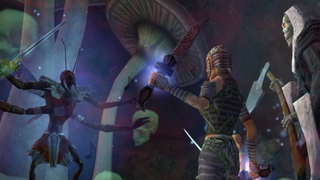
"We have more players now than we did in 2015 and our revenue has gone up," says Longdale. "And that's thanks to these servers. The Project 1999 guys are not malicious or trying to steal our money. So we just have an agreement in place that they don't launch stuff around the same time we do."
"Nostalgia is a powerful thing," she adds. "We get fan letters from people who say they used to watch their parents play EverQuest, and now they do. There's an audience there to bring in, because nostalgia is all the rage right now. Even the mobile version of RuneScape is doing well. So we're trying to lean into that history while we think about what EverQuest is and how it might evolve."
As for the future of EverQuest, Daybreak has plans, but none it's willing to share yet. "We want to evolve, but we don't want to lose what keeps a game sticky for 20 years," says Longdale. "Our biggest customer service request is people asking what email they used for their EverQuest account 15 years ago, because they want to log back in and play with their old characters again."
"We're not focused on bringing new players in for our current products. But for future games, we definitely want to bring in a whole new audience. Let's be real: our core audience does skew a lot older than most other games. They maybe have a greater amount of disposable income, while younger players might not have as much money to spend on something frivolous like a mount."
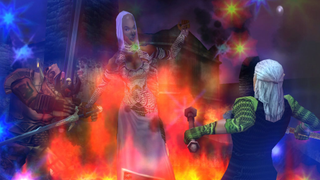
"In a free-to-play world, we do rely heavily on people spending money on stuff like this. So in the future we'll need to engage new players to extend the brand, and give it new life with a younger audience. A staggering number of players have passed through EverQuest in the last 20 years, and we still get new ones who have been drawn in by the nostalgia of the classic servers."
Speaking to developers at Daybreak, it's clear that EverQuest players like what they like, and aren't too receptive to change. That's another part of the game's ongoing success, I think: its familiarity. It's the game people remember, and it hasn't changed much, or at all, to reflect the habits of modern gamers.
"One of our biggest lessons is that all an EverQuest player cares about is power," says Longdale. "Where's the raid, what does it drop, and how many times do I have to do it to get all the pieces? Every three years we do a level increase, and we have changed the way some things work. But really, the biggest, most fundamental change we've made is adding the progression servers."
"When we launched the first one in 2015, we crashed the servers. There were too many logins. A few days later we launched another, and that crashed too. And this is what led to us increasing our player base for the first time in 6-7 years. In the future we'll also be offering two ways to play the progression server, from ultra casual to super hardcore, which has some terrible things in it. There are players out there who want both of those experiences."
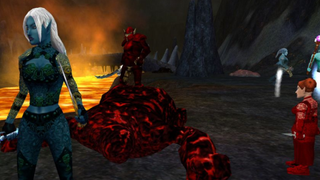
"But fundamentally, we don't want to change the game," she explains. "It's like when we did the New Game Experience for Star Wars Galaxies and everyone quit. But EverQuest needs a little sparkle, especially in combat. We're also doubling down on the game being co-op. There are a lot of raids you can't do without the right combination of classes and abilities, so you'll need certain buffs to survive—and this again helps to create a community."
"We do have solo classes for players who want to break the game and do things they shouldn't be doing. You know kiting, right? That was never intended gameplay. That was druids and wizards figuring that out by themselves. But whatever our next project is, people have to need each other."
Will EverQuest ever die? Daybreak may stop developing it eventually, but it'll always exist in some form—whether that's on community-run servers, or just in the fond memories of the thousands of people who have played and loved it over the years. But for now it shows no signs of giving up. A new expansion, The Burning Lands, was released in December last year, and another is on the way. And with a brand new game potentially on the horizon, the land of Norrath should be a home for adventurers for many more years to come.
If it’s set in space, Andy will probably write about it. He loves sci-fi, adventure games, taking screenshots, Twin Peaks, weird sims, Alien: Isolation, and anything with a good story.
Most Popular


